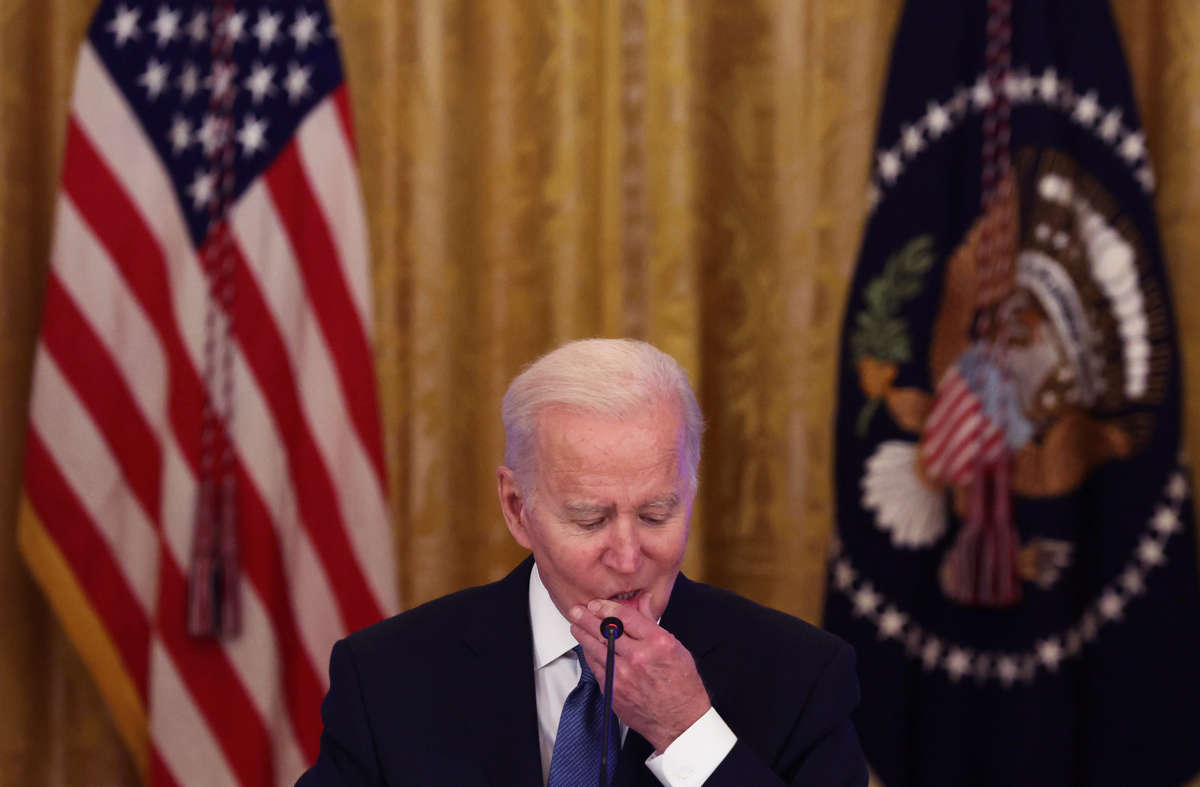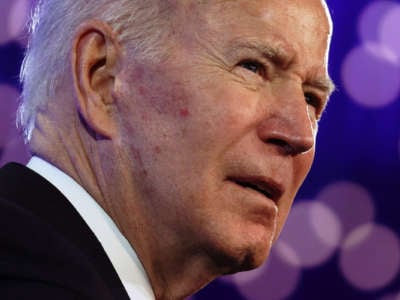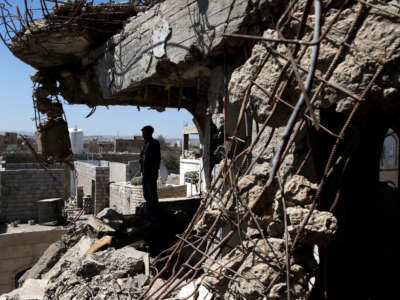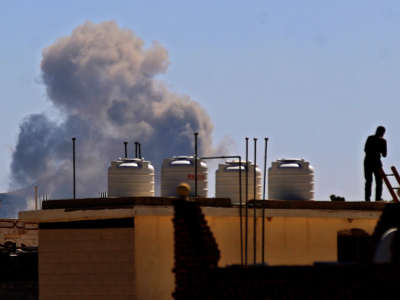
In late January, the Saudi-United Arab Emirates (UAE) coalition carried out an airstrike on a prison in Yemen, killing more than 90 detainees and injuring many more. Among the rubble was a fragment of the weapon used to do it. On it was a Raytheon Technologies manufacturer code. A few days later, the CEO of Raytheon, Greg Hayes, was discussing the escalation of the war in Yemen and Ukraine when he said, “I fully expect we’re going to see some benefit from it.”
The Biden administration, ignoring its promises about Yemen from a year ago, is embracing the escalation of the war as they refuse to suspend any support to Saudi Arabia. Raytheon, a company that sees profits from the war in Yemen, gave President Joe Biden’s presidential campaign over half a million dollars in 2020.
In early November of 2021, the Biden administration announced a massive arms sale of $650 million worth of medium-range missiles and missile rail launchers to Saudi Arabia. The primary contractor for these weapons is Raytheon.
Aisha Jumaan, the Yemeni founder of Yemen Relief and Reconstruction Foundation, called out the responsibility of arms supplying companies like Raytheon, saying, “I would like to ask Greg Hayes, what would you say to the family members of those who were killed by your weapons? How would you feel if your family was targeted by these arsenals?”
Finding United States-manufactured weapons in Yemen is nothing new. In 2018, a bomb later identified as a Lockheed Martin product was dropped on a Yemeni school bus, killing more than 40 children.
When people discuss who is winning the war in Yemen, the answer will never be the Houthis, Saudi Arabia, or the UAE. Weapons companies funded by the U.S. taxpayer through Pentagon contracts are who’s winning the war. Weapons manufacturers that reinvest their money into political campaigns like President Biden’s are who’s winning the war.
With Saudi Arabia remaining the number one buyer of weapons from the U.S, these companies make millions — sometimes billions — of dollars arming the Saudi-UAE led coalition, and Biden took campaign donations from all of them. According to OpenSecrets, Biden’s campaign took $527,010 from Raytheon, $447,047 from Lockheed Martin, $726,873 from Boeing, $416,276 from Northrop Grumman, and $237,104 from General Dynamics.
U.S. companies are coming out on top at the expense of 30 million Yemenis, and the president’s political campaigns benefit from the companies’ ability to make so much money off conflict.
On February 4 of last year, President Biden announced to the world that the U.S. would be ending “offensive” support for the war in Yemen. Peace activists rejoiced for a moment but were quick to ask Biden what “offensive” really meant. What wasn’t “offensive” about Saudi Arabia and the UAE waging war and maintaining a blockade on a sovereign country like Yemen? Activists asked him what the announcement meant. Members of Congress asked for clarification as well. They never got answers. A year later, bombs are raining down on Yemen’s main cities while the flow of weapons from the U.S. to Saudi Arabia remains unimpeded, and manufacturing codes of Biden’s campaign donors are still found in the rubble left behind by war crimes.Raytheon, a company that sees profits from the war in Yemen, gave President Joe Biden’s presidential campaign over half a million dollars in 2020.
On the anniversary of Biden’s announcement promising to end offensive support to Saudi Arabia, the situation on the ground is worse than ever. Airstrikes have gone up in the first year of Biden’s presidency, compared to former President Donald Trump’s last year in office. Fuel and food are still not allowed to flow freely into Yemen because of the Saudi blockade. Fuel shortages are causing hospitals to risk losing power as they try to treat the countless children who are malnourished. Worst-case estimates say that a child dies every 75 seconds in Yemen.
Blaming Biden for his refusal to act isn’t enough now. His campaign donors like Raytheon and Lockheed Martin benefit from the carnage. Their executives feel comfortable enough with that fact to admit it openly in their meetings.
In 2018 and 2019, when President Trump refused to act, Democrats and some Republicans in Congress made it a point to pass a War Powers Resolution to signal to the White House that Congress does not consent to the U.S.’s role in Yemen. Lawmakers in Congress must introduce and pass a new War Powers Resolution for Yemen soon if they are serious about ending U.S. complicity in the war.Well, this is awkward.Friend, we urgently need your support. Yes, it can be awkward to ask for help, but we’ll do whatever it takes to ensure Truthout survives — we believe in this work that much.Trustworthy, fearless reporting is desperately needed, but there are far too few media sources that can deliver. Independent news outlets like this one are irreplaceable, so if you appreciate what we publish, please donate what you can, or consider starting a new monthly donation to sustain and strengthen honest journalism. DONATE NOWCopyright © Truthout. May not be reprinted without permission.Danaka Katovich
Danaka Katovich is a national organizer at CODEPINK. Danaka graduated from DePaul University with a bachelor’s degree in political science in November 2020. Since 2018, she has been working toward ending U.S. participation in the war in Yemen. At CODEPINK, she works on youth outreach as a facilitator of the Peace Collective, CODEPINK’s youth cohort that focuses on anti-imperialist education and divestment.MORE BY THIS AUTHOR…
RELATED

Biden Claims He Wants to End the Yemen War. His Actions Suggest Otherwise.
The U.S.’s role in perpetuating the conflict in Yemen is making peace negotiations more difficult.by John Knefel, Truthout

Let’s Abandon False Dichotomy of “Offensive vs. Defensive” Support for Yemen War
The characterization is meaningless because Saudi Arabia’s involvement in Yemen is entirely offensive.by Danaka Katovich, Truthout

Yemen Crisis Linked to Weapons Maker Raytheon’s Influence on US Foreign Policy
Weapons makers like Raytheon don’t just follow U.S. foreign policy; they make it through allies embedded in government.by Chrisana M. Panzica, Truthout
——————————————
READING LIST
POLITICS & ELECTIONS
Convoy Movement Isn’t a Struggle Over Freedom, It’s an Attempt to Kill Democracy
POLITICS & ELECTIONS
Trump’s Illegal Document Shredding May Haunt Him in January 6 Investigation
ENVIRONMENT & HEALTH
No, Biden Is Not Handing Out Crack Pipes. Here’s Why Activists Do.
ENVIRONMENT & HEALTH
“Politics as Usual” Will Never Be a Solution to the Current Climate Threat
ECONOMY & LABOR
Labor Caucus Calls for Passage of PRO Act to Stop Starbucks’s Union Busting
POLITICS & ELECTIONS
Trump Took “Top Secret” Classified Material to Mar-a-Lago Estate



